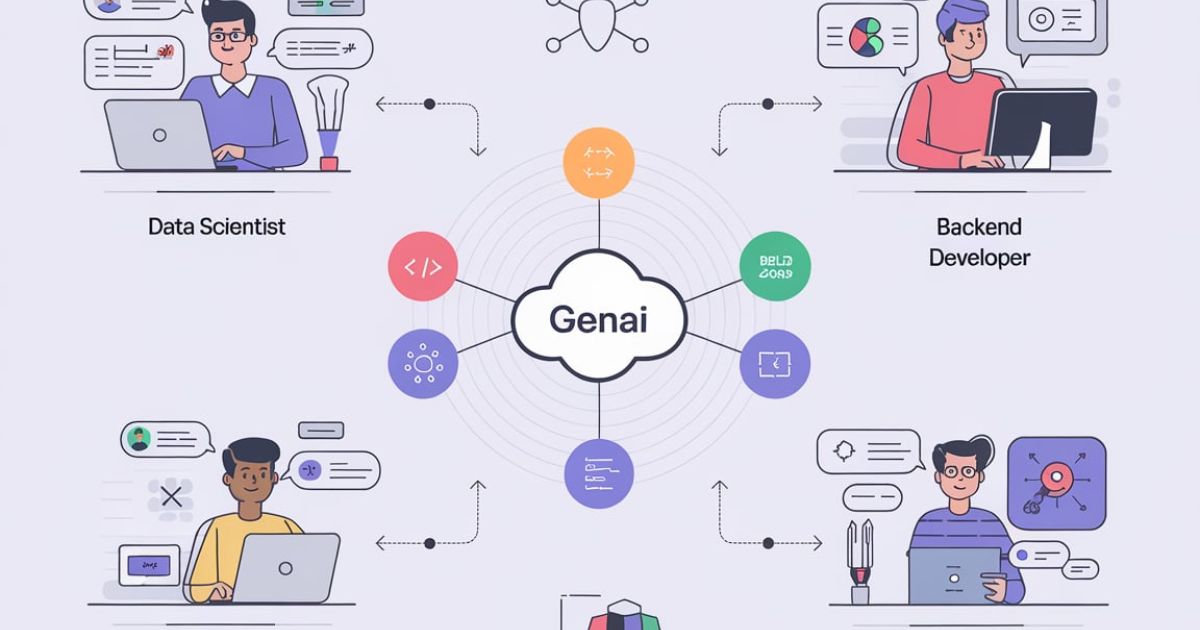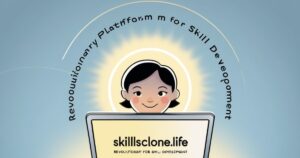In the ever-evolving world of mobile app development, Generative Artificial Intelligence (GenAI) is emerging as a game-changing force.
As we dive into the intricate landscape of tailoring GenAI products for diverse mobile developer personas, we’ll explore how these AI-driven tools are reshaping the way apps are built, tested, and deployed.
From iOS to Android, and from independent developers to enterprise teams, GenAI is poised to transform every facet of the mobile development ecosystem.
Understanding the Mobile Developer Landscape
The mobile app development landscape is a complex tapestry of technologies, platforms, and methodologies. With over 6.8 billion smartphone users worldwide as of 2023, the demand for innovative and efficient mobile apps has never been higher.
This burgeoning market has given rise to a diverse array of developer personas, each with unique needs, challenges, and workflows.
The Evolution of Mobile Development
Mobile development has come a long way since the introduction of the first iPhone in 2007. Today, developers work with sophisticated Integrated Development Environments (IDEs) like Xcode for iOS and Android Studio for Android.
These powerful tools have become the cornerstone of app creation, offering features like code completion, debugging, and performance profiling.
However, the rapid pace of technological advancement presents constant challenges. Mobile developers must keep up with:
- Frequent updates to mobile operating systems
- New device releases with varying capabilities
- Evolving user expectations for app performance and design
- Increasing demands for cross-platform compatibility
In this dynamic environment, GenAI emerges as a powerful ally, offering tailored solutions to help developers navigate these complexities.
Understanding the Diverse Personas of Mobile Developers
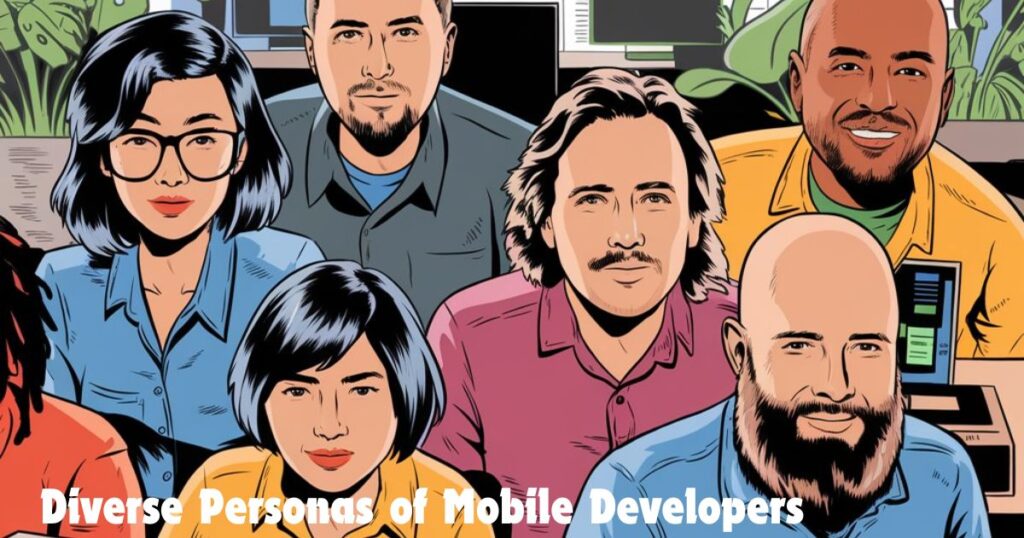
To truly appreciate the impact of tailoring GenAI products, we must first understand the diverse personas that make up the mobile developer community.
Each persona brings a unique set of skills, experiences, and goals to the table, necessitating a personalized approach to AI-driven tools.
Key Developer Personas
- Independent Developers
- Solo entrepreneurs or small teams
- Focus on rapid prototyping and MVP development
- Often work on tight budgets and timelines
- Enterprise Developers
- Part of large organizations
- Emphasize scalability, security, and compliance
- Collaborate with multiple teams and stakeholders
- Game Developers
- Specialize in creating interactive entertainment
- Balance creativity with technical performance
- Often work with complex 3D engines and physics simulations
- Cross-Platform Developers
- Create apps that run on multiple operating systems
- Use frameworks like Flutter, React Native, or Xamarin
- Prioritize code reusability and consistent user experiences
- UI/UX-Focused Developers
- Concentrate on creating intuitive and visually appealing interfaces
- Stay current with design trends and user behavior patterns
- Emphasize accessibility and user testing
- Backend-Focused Developers
- Specialize in server-side logic and database management
- Work on API development and integration
- Prioritize performance optimization and scalability
By recognizing these distinct personas, we can begin to understand why a one-size-fits-all approach to GenAI tools falls short. Each group has its own set of challenges, priorities, and workflows that require tailored solutions.
Read This Post: 1944 Wheat Penny Value and History
The Role of Personalization in GenAI Products
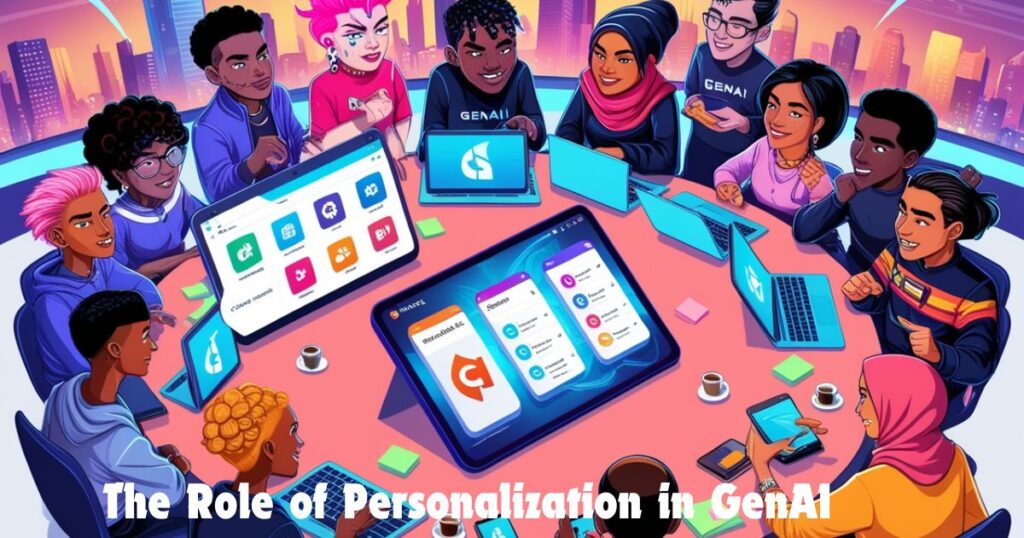
Personalization is at the heart of effective GenAI products for mobile developers. By adapting AI tools to individual developer needs, we can significantly enhance productivity, creativity, and overall satisfaction.
Let’s explore how personalization manifests across different aspects of mobile app development:
Code Completion and Suggestions
GenAI-powered code completion tools can be tailored to each developer’s coding style and project requirements. For instance:
- An independent developer working on a quick prototype might receive suggestions optimized for rapid development and minimal boilerplate code.
- An enterprise developer, on the other hand, might see suggestions that adhere to company-wide coding standards and incorporate necessary security checks.
Debugging and Error Prediction
AI-driven debugging tools can be personalized based on a developer’s history and common issues within their specific domain:
- Game developers might receive specialized suggestions for optimizing render loops or reducing memory leaks.
- UI/UX developers could get insights on potential accessibility issues or design inconsistencies.
Performance Optimization
Tailored GenAI products can offer personalized recommendations for improving app performance:
- For iOS developers, the AI might focus on optimizing for the latest Apple Silicon processors.
- Android developers might receive suggestions for reducing battery consumption on a wide range of devices.
Collaborative Features
GenAI tools can enhance team collaboration by adapting to specific workflow needs:
- Enterprise teams might benefit from AI-powered code review systems that understand company-specific best practices.
- Open-source project maintainers could use AI to help manage contributions and maintain consistency across a diverse contributor base.
By tailoring these features to specific developer personas, GenAI products become invaluable assets in the mobile development toolkit.
Integrating GenAI into Mobile Development Workflows
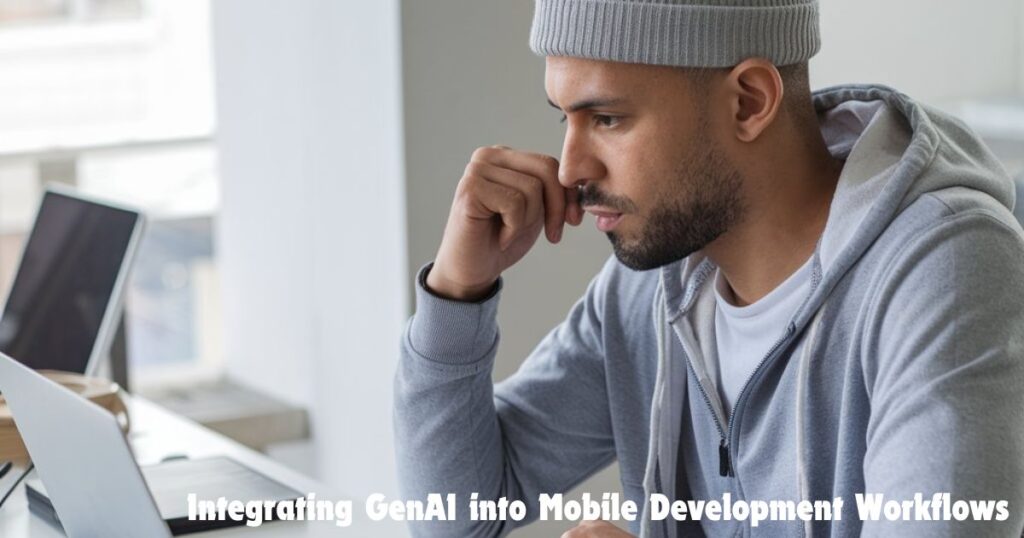
The successful integration of GenAI into mobile development workflows requires a thoughtful approach that balances automation with human creativity. Here are some key considerations:
- Seamless IDE Integration: GenAI tools should integrate smoothly with popular IDEs like Xcode and Android Studio, providing context-aware assistance without disrupting the developer’s flow.
- Version Control Synergy: AI-driven features should work in tandem with version control systems like GitHub and GitLab, offering insights based on repository history and team collaboration patterns.
- Continuous Learning: The AI should adapt to the developer’s evolving skills and project requirements, continuously refining its suggestions and assistance.
- Explainable AI: Developers should have insight into why the AI is making certain suggestions, fostering trust and enabling informed decision-making.
- Customizable Automation: Allow developers to fine-tune the level of AI assistance, from subtle suggestions to more extensive code generation.
By carefully integrating GenAI into existing workflows, we can enhance developer productivity without sacrificing the creative and problem-solving aspects that are core to software development.
Addressing the Unique Challenges of Mobile Developers
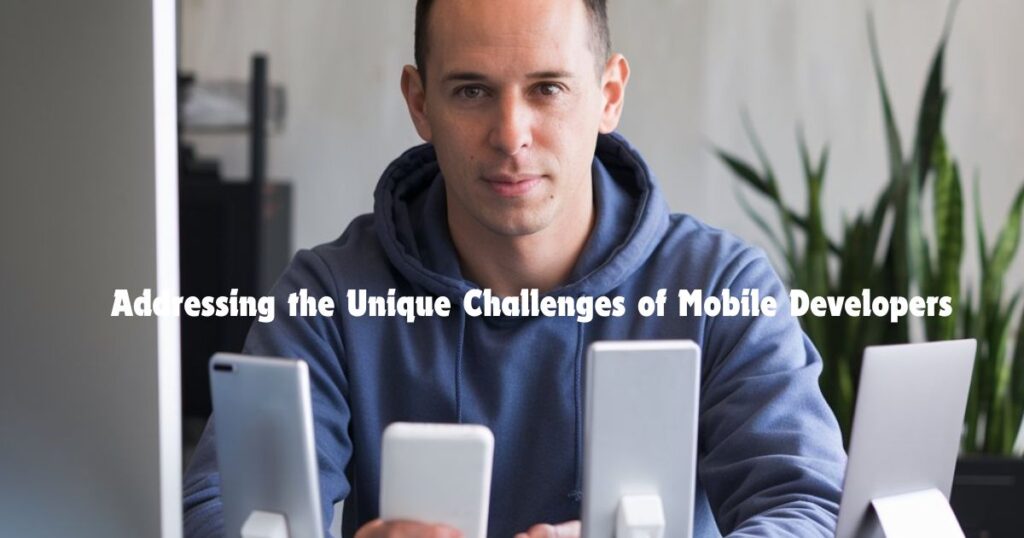
Mobile developers face a unique set of challenges that set them apart from other software developers. Tailored GenAI products must address these specific pain points to truly add value. Let’s explore some of these challenges and how AI can help:
Platform Fragmentation
Challenge: Developing for multiple OS versions and device types.
GenAI Solution: AI-powered testing and compatibility analysis that simulates app behavior across a wide range of devices and OS versions.
Performance Optimization
Challenge: Ensuring smooth performance on resource-constrained mobile devices.
GenAI Solution: Intelligent code analysis that identifies potential performance bottlenecks and suggests optimizations tailored to specific device capabilities.
Battery Efficiency
Challenge: Creating apps that don’t drain battery life excessively.
GenAI Solution: AI-driven profiling tools that analyze code for battery-intensive operations and recommend more efficient alternatives.
User Interface Design
Challenge: Crafting intuitive UIs that work across various screen sizes and input methods.
GenAI Solution: AI-assisted design tools that generate adaptive layouts and suggest UI components based on current design trends and usability best practices.
Rapid Release Cycles
Challenge: Keeping up with frequent OS updates and new device releases.
GenAI Solution: Automated code migration tools that help developers quickly adapt their apps to new platform features and requirements.
By addressing these unique challenges, tailored GenAI products can significantly streamline the mobile development process and help developers create more robust, efficient, and user-friendly apps.
Case Study: GenAI in Action
To illustrate the power of tailored GenAI products, let’s consider a hypothetical case study:
Company: MobiHealth, a startup developing a cross-platform health tracking app
Team: 5 developers (2 iOS, 2 Android, 1 backend)
Challenge: Rapidly develop and launch a MVP while ensuring data privacy and cross-platform consistency
GenAI Solution: Implemented a tailored AI development assistant with the following features:
- Cross-platform code generation optimized for Flutter
- HIPAA-compliant code suggestions for handling sensitive health data
- Automated UI component creation that maintains consistency across iOS and Android
- Performance optimization recommendations specific to health tracking algorithms
Results:
- 40% reduction in development time
- 30% decrease in cross-platform inconsistencies
- 50% fewer security-related bugs identified during testing
This case study demonstrates how tailored GenAI products can address the specific needs of a development team, leading to significant improvements in efficiency and quality.
Read This Post: FintechZoom AMC Stock Analysis And Forecast
The Future of GenAI in Mobile Development
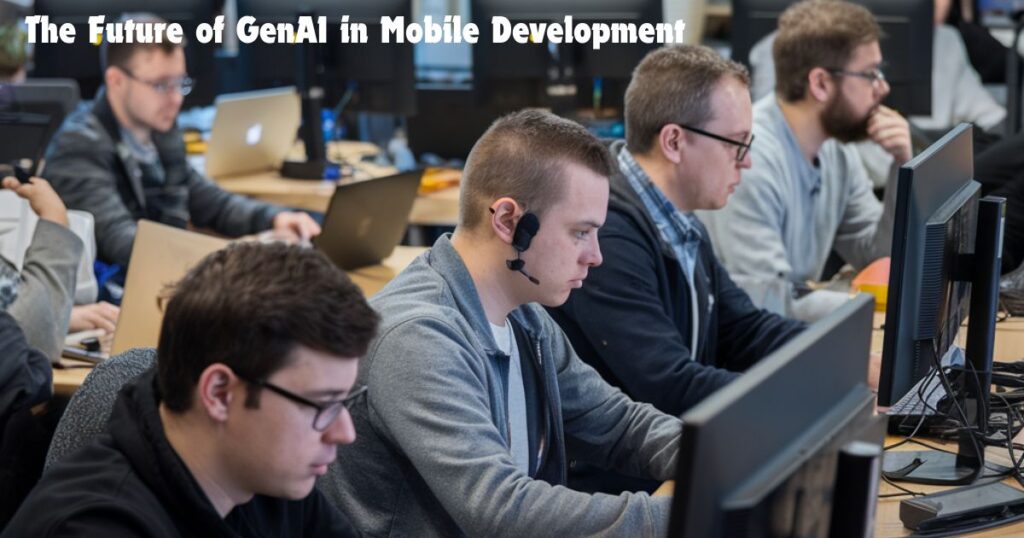
As we look to the future, the potential for GenAI in mobile development is boundless. We can anticipate several exciting developments:
- AI-Driven Design Systems: GenAI could generate entire design systems based on a few input parameters, ensuring consistency across an app ecosystem.
- Predictive Testing: AI might predict potential user interactions and automatically generate test cases, significantly reducing QA time.
- Natural Language App Development: Developers might describe app features in natural language, with AI translating these descriptions into functional code.
- Adaptive Performance Optimization: GenAI could dynamically adjust app performance based on real-time usage data and device capabilities.
- AI-Assisted Localization: Automated, context-aware translation and cultural adaptation of apps for global markets.
These advancements promise to make mobile development more accessible, efficient, and innovative than ever before.
Conclusion: Embracing the GenAI Revolution
Tailoring GenAI products for diverse mobile developer personas is not just a trend; it’s a necessity in the rapidly evolving landscape of mobile app development.
By understanding the unique needs, challenges, and workflows of different developer types, we can create AI-driven tools that truly enhance productivity, creativity, and code quality.
As we’ve explored throughout this article, the potential benefits are immense:
- Faster development cycles
- Improved code quality and performance
- Enhanced cross-platform consistency
- More intuitive and user-friendly apps
- Reduced development costs and time-to-market
However, realizing these benefits requires a thoughtful approach to AI integration, one that respects the human elements of creativity and problem-solving that are central to great software development.
As we stand on the brink of this GenAI revolution in mobile development, the question for developers and organizations is not whether to embrace these tools, but how to do so most effectively.
By tailoring GenAI products to the diverse needs of mobile developer personas, we can unlock new levels of innovation and efficiency, pushing the boundaries of what’s possible in mobile app creation.
The future of mobile development is here, and it’s powered by personalized, intelligent, and ethical AI assistance. Are you ready to be part of this exciting transformation?
